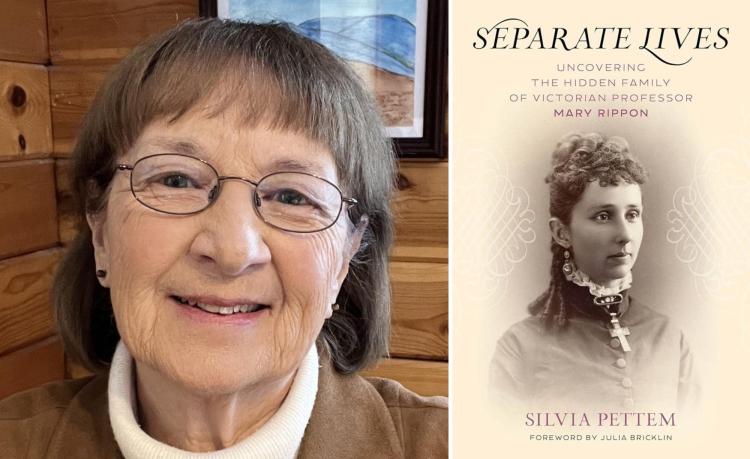Professor Mary Rippon led a secret, separate life
In book, CU Boulder alumnus Silvia Pettem details a little-known chapter of the trailblazing faculty member's story
As a student at the University of Colorado, I often passed through the Mary Rippon Outdoor Theater on the way to my classes. I had assumed Rippon was a woman associated with the theater department, but that was not so. I later learned that she had arrived in Boulder in 1878 and became the university's first female professor. After her death in 1935, then-President George Norlin named the theater (then under construction) in her memory.
Publicly, "Miss Rippon" was highly respected by students and faculty. However, unknown to Norlin and the others, she had a secret private life that would have been considered scandalous, had she not hidden her husband and daughter behind a Victorian veil of secrecy.
The long-concealed truth was revealed in 1986 when an elderly man donated Rippon's diaries, account books, and journals to the university's archives. He was Rippon's grandson and revealed that she had had a romantic relationship with one of her students, became pregnant in 1888, secretly married, and took a year's sabbatical in Germany to give birth.

CU Boulder alumnus and historian Silvia Pettem (left) wrote Separate Lives about a little-known chapter in the life of influential CU Boulder Professor Mary Rippon, namesake of the campus theater.
At the time, there was no rule concerning teacher-student relationships, as it never occurred to anyone to implement one. Rippon was 37, and her husband, Will Housel, was 25. When the baby, Miriam, was born, Housel was still at CU in his senior year.
After graduation, Housel joined his wife and daughter in Europe before Rippon returned to Boulder and continued to teach as if nothing in her life had changed. Housel and Miriam remained in Europe, where he attended graduate school. Initially, Miriam was placed in a series of orphanages. At the age of 4, she was taken to Rippon's extended family in Illinois.
At the time, Victorian-era society expected women with children to be supported by their husbands. If a professional woman married, she would have been accused of taking a job away from a man with a family to support. Rippon had to completely separate her public and private lives in order to keep her job. She continued to teach for 20 more years.
As a revered pioneer woman educator, Rippon appears to have valued career over family, but she may have, instead, realized that she needed to work to financially provide for her daughter's care.
Eventually, Rippon and Housel divorced. Housel remarried when Miriam was 8 years old and provided his daughter a home, but he lacked an adequate income. On a salary less than her male colleagues, Rippon continued to support her daughter, as well as her divorced husband, his second wife, and, eventually, their four children!
Meanwhile, Rippon was a role model for her female students, a full professor, and even chair of the Department of German language and literature. Except for confiding in two close friends, she took her secret to her grave in Boulder's Columbia Cemetery.
For decades, the only tangible evidence on the CU campus of Rippon's secret life was ivy that Housel had planted outside of Old Main, where Rippon held her classes. His sentiment was obvious in a poem he penned his senior year that read in part, "But the ivy is for friendship and it seemeth best of all; 'tis the rose of love and petals that will never fade or fall."
Silvia Pettem’s In Retrospect column appears once a month in the Daily Camera, where this first appeared. She can be reached at silviapettem@gmail.com. She will be signing copies of Separate Lives: Uncovering the Hidden Family of Victorian Professor Mary Rippon (Lyons Press, 2024) at the Boulder Bookstore on Oct. 22.

